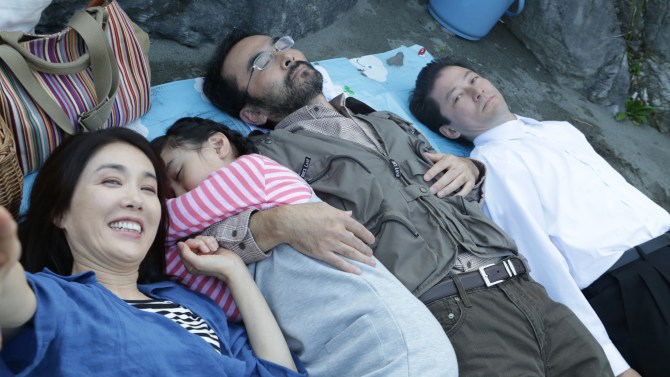In selected cinemas nationwide Fri 5 May 2017
Early in Kôji Fukada’s Harmonium, a beautifully centred shot sees two men mirroring each other’s posture as they sit down to share an overdue talk. The mild-mannered Yasaka (Tabanobu Asano) has recently been released from prison. Toshio (Kanji Furutachi), meanwhile, is a business owner and family man. Yet the reflections they cast of each other hint toward an unspoken past – one that places Toshio on the back foot. In a film driven by secrets, this is only the first.
Soon, Toshio has offered Yasaka both a job and also a place to stay: a decision that comes as a surprise to his wife Akié (Mariko Tsutsui), who is understandably uncomfortable with the intrusion, particularly to the life of the couple’s young daughter, Hotaru. The ex-con’s unusual behaviour hardly helps to put things at ease, the effects of institutionalisation seeing him speak in a stiltedly formal manner, sleep with the lights on and eat every meal as if it were about to be snatched from his grasp. But there is more to him; contemplative and quiet, Yasaka seems at peace with who he is and whatever it is he has done. His talent for playing the family harmonium even creates a bond with Hotaru. As a woman of faith, Akié can’t help but feel curiosity and empathy for the once lost soul.
Fukada’s film, however, is built around what we don’t see just as much as what we do. A performer of impressive range (appearing in films as disparate as Ichi the Killer to the Marvel’s Thor), Asano balances his portrayal of Yasaka perfectly. Sympathetic one second and unnerving the next, his placid exterior at times seems to conceal an understandable envy for the normalities of family life. Similarly, Tsutsui excels as Akié, a woman whose life has seen her become both wary and yearning to trust.
With the story broken into two halves – the division punctuated by a grim and shocking act – it is the first that is the best measured, a simmering, tension riddled observation on the notions of crime, punishment and the potential for retribution. With the opening arc rendered so effectively, the remainder could have just been a coda; instead, the second segment ups the film’s focus on the devastating power of secrets, but also doubles-down on bleakness. It’s consistently intriguing and, at times, stunningly poignant, but occasionally veers a little too far into the realms of melodrama. It doesn’t undo the narrative, but it does leave it feeling a little overlong and also, perhaps, just a touch overwrought.
